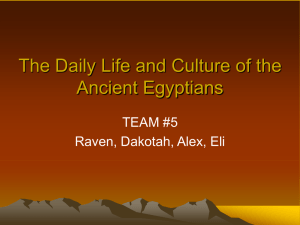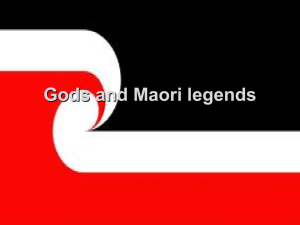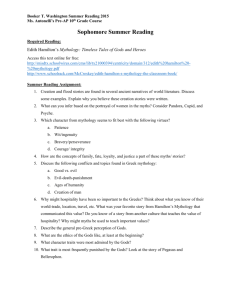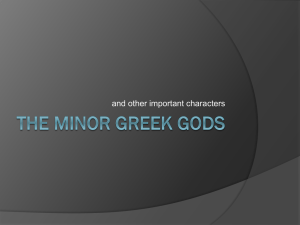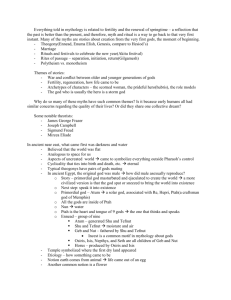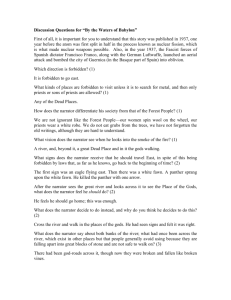Period 2-BTWOB answers
advertisement
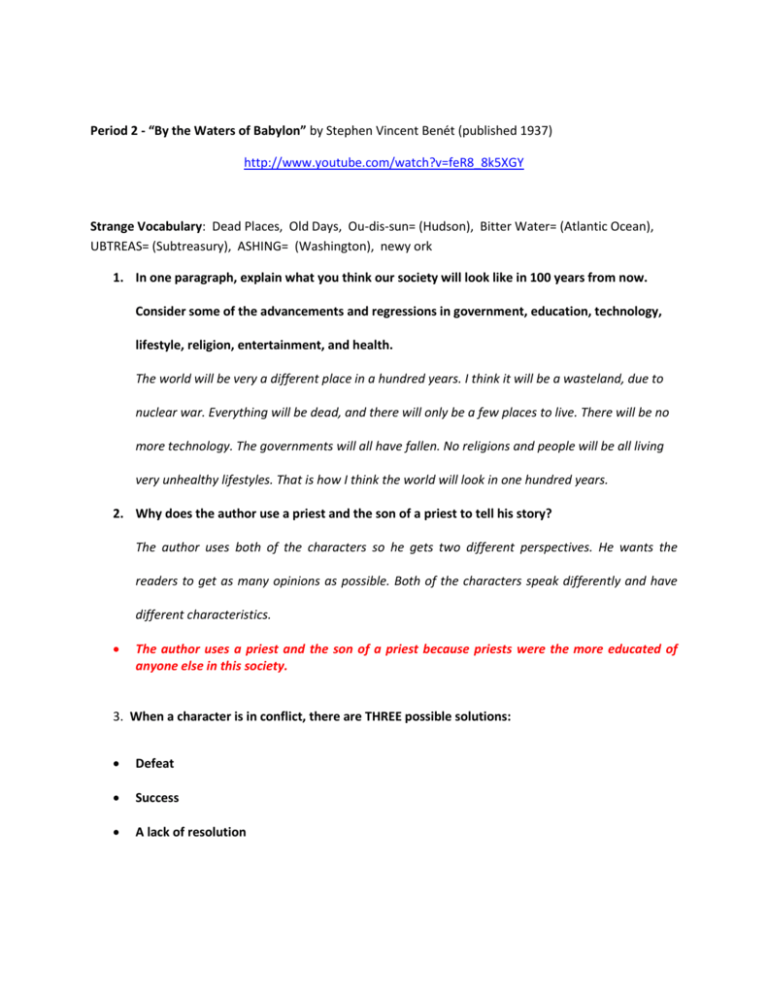
Period 2 - “By the Waters of Babylon” by Stephen Vincent Benét (published 1937) http://www.youtube.com/watch?v=feR8_8k5XGY Strange Vocabulary: Dead Places, Old Days, Ou-dis-sun= (Hudson), Bitter Water= (Atlantic Ocean), UBTREAS= (Subtreasury), ASHING= (Washington), newy ork 1. In one paragraph, explain what you think our society will look like in 100 years from now. Consider some of the advancements and regressions in government, education, technology, lifestyle, religion, entertainment, and health. The world will be very a different place in a hundred years. I think it will be a wasteland, due to nuclear war. Everything will be dead, and there will only be a few places to live. There will be no more technology. The governments will all have fallen. No religions and people will be all living very unhealthy lifestyles. That is how I think the world will look in one hundred years. 2. Why does the author use a priest and the son of a priest to tell his story? The author uses both of the characters so he gets two different perspectives. He wants the readers to get as many opinions as possible. Both of the characters speak differently and have different characteristics. The author uses a priest and the son of a priest because priests were the more educated of anyone else in this society. 3. When a character is in conflict, there are THREE possible solutions: Defeat Success A lack of resolution Summarize the conflict in this story. If there is more than one, summarize each one. Include the solutions for each conflict. 1. He struggles with his heart because it tells him that he should travel to the forbidden place of the Gods. Solution = He simple decides to defeat his fear and not let his heart stop him. 2. He struggles with telling himself to finally go across the river. Solution= Again he defeats this by not letting his fear get to him. 3. He struggles with actually crossing the river and the wild dogs that try to attack him in the place of the Gods. Solution = 4. Benet suggests the boy’s internal conflict as he courageously faces his fear of the forbidden. 5. He sees the panther’s quick death as a sign, resolving his inner conflict over continuing into the forbidden area. 6. The narrator’s inner conflict becomes a choice between risking physical death and spiritual death. 7. John’s inner conflict is his wish for knowledge versus his superstitious fear. 8. 4. What does the narrator tell about the Place of the Gods? (Jennica, Monika, Mike, Rob) It is across the great river, but no one is allowed to look upon it or say its name. Spirits and demons live there, and there are ashes from the Great Burning. 5. What do these beliefs suggest about the narrator’s society? The narrator`s beliefs lead me to believe that he may be in almost like an aboriginal village that stayed away from society ever since the beginning and because of this they weren`t affected by the war, that had killed the gods or the man-humans. The society is one based upon fear and superstition. The people are controlled by strict laws. A catastrophe of some kind (the “great burning”) occurred at an unspecified time in the past. 6. Why does the author use first person point of view in this story? I believe that the author used first person point of view because they wanted the reader to see the world the same way that the priest-priest`s son did so that we can see what we are doing to our world, from a different point of view. Benet uses first-person point of view to confine the reader’s knowledge to that of the narrator, John, the son of a priest. 7. Why is it that only priests can touch the metal? -because the man and the metal must be purified Since this is a society based on fear and superstition, this makes sense. The priests are the most respected, most educated, and considered to be of a higher power. 8. Explain why the author included the narrator’s out-of-body experience (253). In your opinion, was it necessary to our understanding of the story? Why or why not? -Yes, he got to see what it is like in the city of gods, sounds like foreshadowing He says that the spirits drew his spirit from his body He may be dreaming, but he is definitely seeing sights of which he has no experience. As a member of a priest’s family, he may have psychic powers. 9. Why does John’s father send him off on his own? What is a Rite of Passage? John`s father sent him off so that he could become a priest and so that he could become a man. A Rite of Passage is an event that someone participates in to make a transition from one status to another. A couple of examples are Confirmation or Bar Mitzvah His father sends him off to become a man. A Rite of Passage is a ritual performed in some cultures at times when an individual changes status (as from adolescence to adulthood) 10. Characterization: What characteristics does John reveal about himself along his journey? Be sure to support your answer with proof from the story. On John`s journey he was a very strong-willed person. He went fasting and continued on with it even when he could have quit. John showed a lot of bravery during his journey. He continued on his journey despite what he saw. Like when he saw all the strange things (a cooking place with no wood) He reveals his intelligence, resourcefulness, and self-reliance as he finds a door to close against the attack of the wild dogs. 11. Plot – Climax: The climax of the story occurs when John realizes what? The climax is when John realizes that the man and all the men in the place of the Gods were just normal people. He also realizes that they are more advanced, but they`re just like him. The climax occurs when John realizes that men, not gods, built the city and caused the destruction of their own civilization. 12. The narrator says, “Perhaps in the old days, they ate knowledge too fast.” In a well-supported paragraph, show how “eating knowledge too fast” might have devastating effects in our society. It would have a devastating affect, ``eating knowledge too fast`` because then people will advance into the future too fast. Meaning people will be worried about the future and not focusing on the present and therefore they won`t worry about things like war and helping charity. Passages from the story where the writer forms a picture in the readers mind. “But near there, I found food, in the heart of the ruin, behind a door that still opened. I ate only the fruits from the jars- they had a very sweet taste. There was drink, too, in bottles of glass-the drink of the gods was strong and made my head swim. After I had eaten and drunk, I slept on the top of a stone, my bow by my side.” (p. 251) “He gave me the bow and three arrows. ‘Take them,’ he said. It is forbidden to travel east. It is forbidden to cross the river. It is forbidden to go to the place of the Gods. All these things are forbidden.” (247248) “He had sat at his window, watching his city die” (254) Ì went fasting, as is the law. My body hurt but not my heart. When the dawn came, I was out of sight of the village.`` ``He punished me more strictly than my brothers`` ``The Gods heard me – they showed me how to paddle with the pole on one side of the raft. The current changed itself-I drew near to the place of Gods`` ``It is there that there are the ashes of spirits live, and demons.`` ``All the same, when I came to the place of Gods, I was afraid, I was afraid.`` ``Dead places now, there are books and the writings.`` ``My knowledge made me happy-it was like a fire in my heart.``(247) ``The towers are not all broken-here and there one still stands, like a great tree in a forest, and the birds nest high.``(250) ``The I saw the dead God. He was sitting in his chair, by the window, in a room I had not entered before…``(254) Part II: Extracting Difficult Material This selection can be read as a “guessing” game. You will have to recognize ordinary objects described by someone with very little knowledge of what they are or what they are called. Identify as many items in the list below as you can. In Column A notice the terms given, these are the narrator’s terminology; in Column B, list the current terminology. Column A: Narrator’s Terminology Great Burning Great Dead Places Eight suns Great river God-road Ou-dis-sun Place of the Gods Old Writings Too big to be houses God-roads across the river Fire fell from the sky Great spike of rusted metal sticking out of the river High towers of the gods A fair island UBTREAS ASHING Shattered Image Carved stones with magical numbers and words Enchanted boxes and jars Great temple with roof painted like the sky Caves and Tunnels Fruits from jars Drink that made his head swim Towers high enough, but not so high Strong door, many stairs Bronze door with no handles Anteroom Coverings on the floors Chairs soft and deep Picture of a bunch of flowers Figure of a bird in hard clay Washing place with no water Cooking place with no wood Lamps with no wicks “Hot” and “Cold” Place to make fire Night, but not dark Column B: Current Terminology Nuclear holocaust Cities A week Hudson River Roads/Highways Hudson River New York City Books Tall buildings Bridges Bombs Piling – support for bridge Skyscrapers Manhattan Subtreasury aka Federal Hall National Memorial Washington Statue Cornerstones; addresses Groceries Grand Central Station Subway system Jams Liquor Apartments Apartment building Elevator Foyer Rugs Easy Chairs/Recliners Impressionist Painting Ceramic Statue Sink Stove Electric Lights Faucets Fireplace His vision of the city, dream; lights of the city Chariots Gods Turned night into day Mist that poisoned The destruction Poison still in the ground Flew in the air All the magic they had Dead god Magic tools are broken Newyork Gods – Lincoln, Biltmore, Moses Hill people Unbelievable tools Big room looking over the city Catacombs Bitter water Enchanted box with food Roaring in my ears 2 Towers Great windows Cars Men Street lights/signs Radiation Result of War Fallout – radiation Airplanes Knowledge/Technology Body – mummified Machines New York Abe Lincoln, Biltmore hotel, Biblical Figure Primitive hunting society Bulldozers, cranes, etc. Livingroom/penthouse Subways the Sea; Ocean Refrigerator Sounds of traffic Twin Towers Picture Windows


